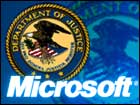|
DOJ, Microsoft settle
|
 |
November 2, 2001: 1:52 p.m. ET
Deal restricts company practices; states aren't yet part of pact.
|
NEW YORK (CNNmoney) - Executives of Microsoft Corp. and government officials said Friday they are hopeful that several states' attorneys general who could stand in its way will sign off on a proposed settlement of the company's long-running antitrust case.
The settlement pact, which Microsoft and the U.S. Justice Department reached late Wednesday and presented in court Friday, imposes a broad range of restrictions on Microsoft's business practices, which would be upheld by an independent, on-site, three-member panel of computer experts.
Under the terms of their agreement, Microsoft may not enter into licensing agreements with PC manufacturers that restrict them from working with other software developers, a practice referred to as "exclusive dealing."
It also would require Microsoft to provide other software makers access to elements of its Windows source code, called application programming interfaces, or APIs, which are necessary for them to make their applications work under the Windows operating system.
However, it does not impose any restrictions on the features Microsoft is allowed to incorporate in its Windows operating system, which was at the heart of the government's case against the company, which has been wending its way through the legal system since 1997.
|  | |
 |
 |
 |
| |
 Bill Gates, chairman of Microsoft, comments on the settlement.
Bill Gates, chairman of Microsoft, comments on the settlement.
| |
 |
"This is a difficult time for our nation and our economy. While this settlement imposes new rules and regulations, we believe that settling the case now is the right thing to do for our customers, for the technology industry and for the economy," Bill Gates. Microsoft's co-founder and chairman, said in a press conference Friday.
U.S. Attorney General John Ashcroft said the settlement opens the marketplace to competition by requiring Microsoft to disclose information it previously considered proprietary and by permitting other companies to do business with competitors without fear of retribution.
"This settlement brings effective relief to the marketplace and ensures consumers have more choices in working with their computers," Ashcroft said. "A competitive software industry is vital to our economy and effective antitrust enforcement is crucial in a constantly changing high-tech environment."
|  | |
 |
 |
 |
| |
 U.S. Attorney General John Ashcroft announces the settlement.
U.S. Attorney General John Ashcroft announces the settlement.
| |
 |
Ashcroft said he believed the settlement fully addressed all of the anti-competitive concerns outlined by a federal appeals court, which upheld a lower court's decision that Microsoft held a monopoly in computer operating systems but overturned its order that the company be broken in two to prevent it from using that monopoly to squash competition.
States yet to sign off
But the settlement agreement does not necessarily mark the end of Microsoft's antitrust odyssey. Eighteen states and the District of Columbia are pursuing a concurrent anti-competition action against Microsoft.
The U.S. district court judge, Colleen Kollar-Kotelly, who approved the settlement Friday, gave the states until Tuesday to decide whether they also would agree to the settlement.
Many expect the states to pursue a tougher course with Microsoft than the proposed DOJ settlement.
Representatives from each state's attorney general's office attended Friday's hearing, including Iowa's Tom Miller, New York's Eliot Spitzer and Connecticut's Richard Blumenthal.
"While there have been some promising developments in the mediation over the past few days, the states have not joined today in the settlement agreement reached between the Department of Justice and Microsoft," Miller said.
"As elected law enforcement officials, we believe that it is imperative that we fully assess the specific language of the agreement. We will complete this evaluation by Tuesday and will communicate our decision at that time to Judge Kollar-Kotelly," he added.
As the case worked its way through the appeals process, Miller was among the most vocal critics of Microsoft's continued integration of functionality and features into its Windows operating system software.
The settlement agreement leaves Microsoft's Windows operating system intact. One of the original goals of the action first brought by the government in 1997 was to unbundle some applications from Windows, specifically its Internet Explorer Web browser.
Miller and other had pointed to Windows XP, Microsoft's newest operating system which integrates streaming Internet media, instant messaging and other multimedia functions, as evidence that Microsoft continues to engage in anti-competitive practices.
Microsoft's competitors were critical of the deal.
Click here for more on the Microsoft trial
The Computer Communications and Industry Association, which had lobbied some of the state attorneys general to ask for court-ordered block of the release of Windows XP, called the agreement ineffective.
The group, which includes key Microsoft foes such as Sun Microsystems, Oracle, Yahoo!, and America Online (a subsidiary of CNNmoney.com parent AOL Time Warner), refuted Microsoft and the Justice Department's claims that it will level the competitive playing field.
"The current settlement proposal will do little to protect consumers, competition, entrepreneurs, and innovation," the CCIA said in a statement.
"It is clear the proposal will not deter Microsoft's illegal behavior or prevent it from leveraging its operating system monopoly into markets for other products and services," the group said. 
|
|
|
|
|
|

|

